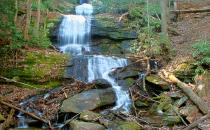Comments filed in massive Chattahoochee forest project
For decades, the public has had a meaningful voice in site-specific decisions made on national forests such as where to log, construct or reroute trails, and which areas should be left alone to protect wildlife. In line with other recent efforts to reduce public involvement in public lands management, the Foothills Landscape Project threatens to end that practice across a vast swath of the Chattahoochee National Forest. SELC and partners submitted comments on this ill-conceived proposal on January 10.
Click here to read the comments in full.
The Foothills Project contemplates more logging in 20% of the acreage of the Chattahoochee National Forest than occurred from 2009-2019 on national forests in Georgia, Tennessee, North Carolina, and Virginia combined. In addition, the agency is proposing up to 74,500 acres of herbicide application, untold “temporary” road construction, potential changes to over 100 miles of trails, construction of over 350 miles of bulldozed fire lines, and converting wood to chips on tens of thousands of acres. At the current pace of logging on the forest, it will take more than four decades to complete all that is proposed.
Problematically, the agency has not decided where these actions will occur on the ground except that they will occur somewhere in an approximately 157,000-acre area.
Federal law requires the Forest Service to disclose the environmental effects of its actions before authorizing them. But the Foothills approach would authorize a suite of actions before the Forest Service even knows where they will occur on the landscape. For years, SELC and its partners have highlighted problems with the approach.
“Regrettably, the Forest Service has wholly disregarded our core suggestions,” reads the letter SELC submitted to the Forest Service. “The draft environmental assessment is rife with errors stemming from the same fundamental problems we have been pointing out to you for years.”
Most problematically, the agency is attempting to conclude all legally required public participation opportunities now before providing basic information necessary to public understanding such as what exactly the agency is proposing to do, when, how, and where.
Despite repeated calls for the agency to offer public comment opportunities in compliance with federal law when site-specific decisions are made, the agency has refused, arguing that meetings in 2016 and 2017—where the agency attempted to foster “debate” about the general value of logging, prescribed burning, and other activities—satisfied obligations to involve the public.
“The agency seems to expect the public to trade away its right to participate in decades of site-specific decision making—a right it is guaranteed under the National Environmental Policy Act—in exchange for a handful of meetings,” the comments continue. “Surely the agency sees that is a terrible trade for the public.”
National forest users spoke out in record numbers against the agency’s misguided approach.

